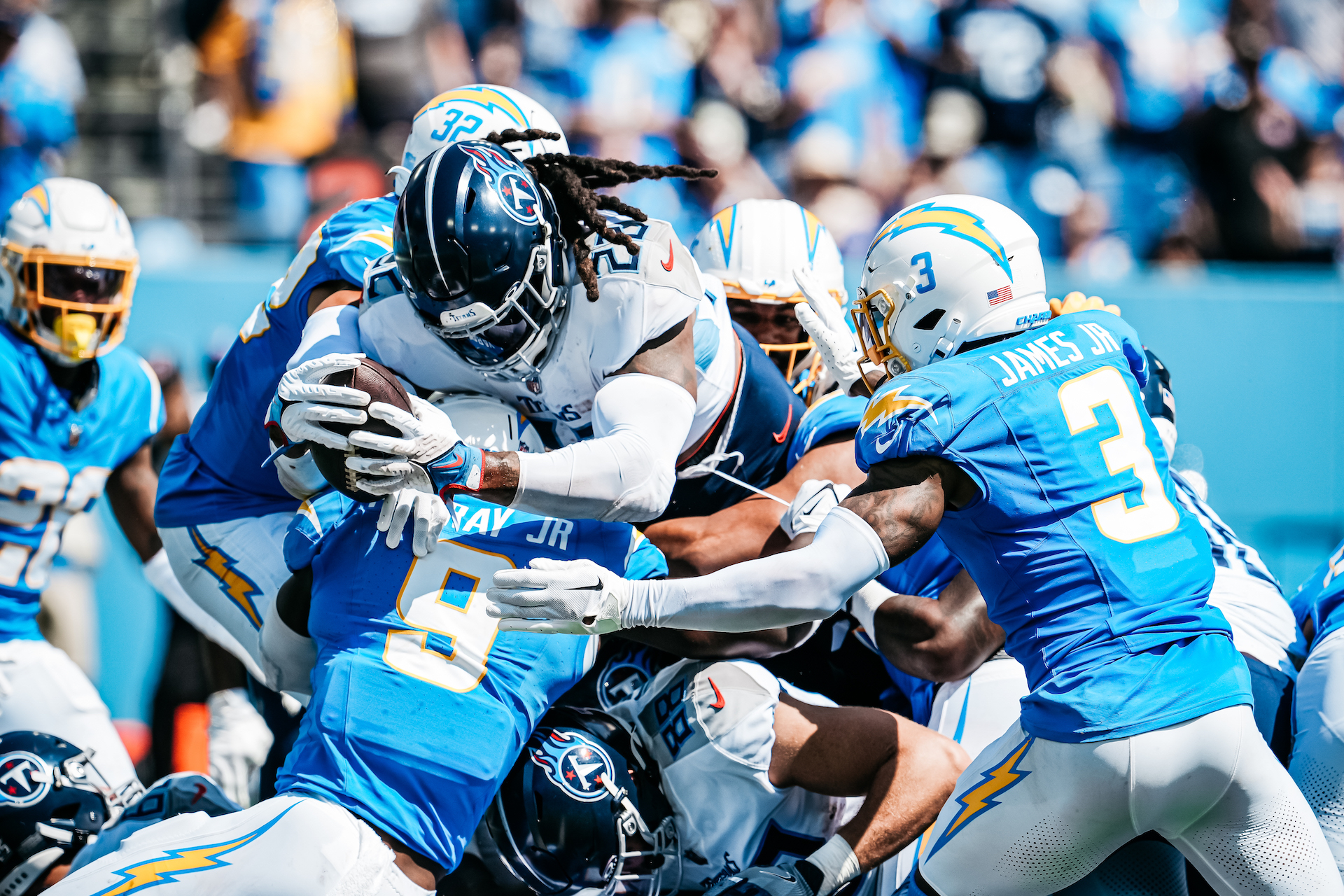NASHVILLE, Tenn. – Through two games, Tyjae Spears has been on the field for 45 percent of the Titans’ offensive snaps.
He’s only carried the ball 11 times and he’s only caught three passes. But on the ground, he’s been very effective, with a 6.9-yard average. That’s an impressive 3.3 yards better than Derrick Henry so far.

It’s hard to worry about reduced use of the guy who’s been the centerpiece of the Tennessee offense for the last five years when he is second in the league with 40 carries through two games. Henry approached 400 touches in 2020 and 2022 and would have been there again in 2021 but for the Jones fracture of his foot that cost him the second half of the regular season.
In his two full seasons over the last three years, he’s touched the ball on 38.5 percent of the team’s offensive plays, and even with the relatively meager game against the Saints he’s at 36.8 percent so far in 2023.
But while the touches are up there, the rushing yardage isn’t so far. On that list he’s ninth
That’s too many numbers in my windup to this: Is Spears going to hurt Henry’s chances at the Pro Football Hall of Fame? [Unlocked]
I think the answer is yes.
Henry is 1,523 yards from 10,000, a mark he’s got to hit to start his Hall of Fame conversation and a mark I’m certain he will hit. The question is how far past it can he get, as 12,000 seems more like the benchmark for the Hall.
He’s got the most yardage for a running back during his time in the NFL, 8,478 yards – 174 more than Ezekiel Elliott with a 4.7-yard average compared to Elliott’s 4.4.
Spears got eight carries and 49 yards against Los Angeles, and in previous years when the Titans didn’t have a quality second running back, Henry would have gotten a few more of those.
Sweet curvilinear bend by Tyjae Spears #Titans pic.twitter.com/u71UokBJQD
— Matt Waldman (@MattWaldman) September 18, 2023
If Spears continues to fare as well as he has through his first two games, he will likely pull more opportunities away from Henry.
Henry’s a high-volume back. With less volume, will he be as effective?
And then what happens beyond this year? Henry is in the last year of his contract. The Titans will have a ton of leverage with him, as he will turn 30 on Jan. 4, 2024. They reportedly tested out his trade value at the scouting combine in the spring and could be ready to say goodbye. The market for veteran backs has been weak.
If he’s back in Tennessee, Spears will likely continue to take on more. If Henry is elsewhere, it’s hard to imagine another team featuring him to the degree the Titans have, and so he will have to last longer to gather the numbers needed and to stack on the impact on the league he’s already made.
#Titans rookie RB Tyjae Spears currently ranks 4th in the NFL in yards after contact per attempt, 2nd in missed tackles forced per attempt, and 2nd in PFF’s elusiveness rating metric.
— Mike Herndon (@MikeHerndonNFL) September 19, 2023
I actually think Tim Kelly swung too far the other direction this week with Henry/Spears usage. pic.twitter.com/lC79BpWQwa
The counterargument: Spears helps make for a fresher, more productive Henry, and maybe helps extend his career by a year or two.
A strong playoff showing in the remainder of his career would also enhance his resume, as he’s averaged 104.6 yards and scored four TDs in seven playoff games.
Thomas becoming the lead blocker after this Henry stiff arm is the baddest thing I’ve seen in quite a while. That man has a family 🤣🤣🤣pic.twitter.com/clH5itZ3KL
— Go Bills 🔥 (@BUFonWECK) January 12, 2020
He could be Frank Gore-esque, an exception to the general age rules regarding running backs. Most hit a wall sometime not long after 30 and their production suffers a steep decline. Gore gained 7,161 yards and scored 30 TDs in eight seasons after he was 30.
The shame of it is that had Henry not suffered the Jones fracture in Indianapolis in 2021, he could have conceivably gone on to a second consecutive 2,000-yard season. He was at 937 yards halfway through the year. Even if he came up short of 2k, he may have won a second Offensive Player of the Year Award in a row.
If Henry ran for the same 937 in the second half of 2021, his four-year span from 2019-2022 would have totaled 6,979, the best four-year span in league history since the merger, topping Eric Dickerson’s 6,968 from 1983-1986.
That would have been an impressive lead to a Hall of Fame presentation, but it’s hypothetical now and as it narrows the field of candidates when Henry becomes eligible, the selection committee won’t deal in such a consideration.
To me, Henry is the best pure runner of his era. But backs in this era are devalued and the ones who are most valued are the ones who are far more well-rounded receivers and three-down backs than Henry is. The case for him is that he’s an outlier – a traditional back a team’s been built around at a time when such a thing was completely uncommon.
He’s got some impressive historical feats:
- Only LaDainian Tomlinson and Adrian Peterson have more than his five consecutive seasons of 1,000 scrimmage yards and 10 touchdowns,
- His 78 rushing touchdowns in his first seven seasons were more than Earl Campbell, Barry Sanders or Jim Taylor had
- He’s tied with Tyreek Hill for the most 65+ yard TDs from 2017-2023 with nine
- From 2016 to the present he leads the NFL with 11 rushing TDs of 50+ yards, and second-place Saquan Barkley has six
- He won the 2020 rushing title with 2,027 rushing yards, outdistancing Dalvin Cook by 470 yards
- He’s the only player in NFL history with two seasons of at least 300 carries, a rushing average of at least 5.0 yards and at least 15 rushing TDs
- He’s the only player in NFL history with three consecutive games with at least 180 rushing yards in three consecutive games.
Jamal Lewis didn't have that many superlatives. But he was a similar back to Henry. He finished his career with a 2,066-yard season and an Offensive Player of the Year Award. While he didn’t have as many other big years as Henry already has, his final yardage was solid (10,607) though his touchdown total was lower (62 total). He was part of a Super Bowl-winning team.
He’s been Hall of Fame eligible since 2015 and has garnered no real support.
Pro Football Reference has a Hall of Fame monitor page. The average score for a Hall of Famer is 100. Henry is 96th on the running back list and only scores 33.45 so far. He’s 95th on the list of all-time backs. The methodology is detailed here.
The average Hall of Fame back has a Super Bowl, three First Team All-Pros, six Pro Bowls and 10 seasons as a starter.
So far Henry has no Super Bowl, one First Team All-Pro, three Pro Bowls, and is heading into his fifth season as a starter.

Here are Hall of Famers from the NFL’s modern era with under 11,236 yards (O.J. Simpson’s mark):
Earl Campbell, 9,407 yards, career ended 1985, inducted 1991: Perhaps the most bruising back in league history, he was First Team All-Pro in his first three years in which he gained 5,081 yards and ran for 45 touchdowns.
Terrell Davis, 7,607, career ended 2001, inducted 2017: Regarded as the best postseason back in history with a 142.5-yard average and 12 rushing TDs in eight playoff games while he was part of two Super Bowl winners.
Larry Csonka, 8,081 yards, career ended in 1979, inducted in 1987: A fullback of a different era, he topped 1,000 yards in three consecutive years when the Dolphins went to the Super Bowl, winning the last two of them.
Floyd Little, 6,323 yards, career ended 1975, inducted 2010: Nearly doubled his rushing yards with his all-purpose yards – 12,173.
There are 15 running backs who are over 10,000 yards and are not in the Hall of Fame including Eddie George and Gore, who is eligible in 2026.
![]() Gore played 15 seasons and gained 16,000 rushing yards but scored only 81 rushing touchdowns – Henry already has 79. Peterson is fifth all-time with 14,918 yards and his 120 TDs are fourth all-time. He seems a sure thing once he is eligible in 2027.
Gore played 15 seasons and gained 16,000 rushing yards but scored only 81 rushing touchdowns – Henry already has 79. Peterson is fifth all-time with 14,918 yards and his 120 TDs are fourth all-time. He seems a sure thing once he is eligible in 2027.
Henry may still have a lot of yards ahead of him, and the 50 voters – of which I’m one – will have five years to ponder his case once he retires.
The early evidence says Spears is the best back he’s had as a teammate since he backed up DeMarco Murray. Spears can speed up the Titans. He may simultaneously slow down Henry’s potential path to Canton.










You are not authorised to post comments.